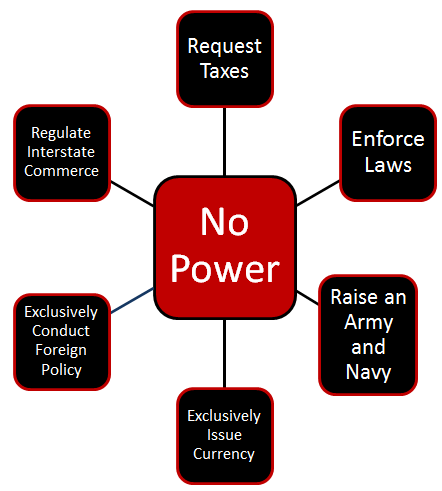
Taxation
The Congress did have the power to request a tax. However, the states had to collect it. The United States accumulated a huge debt during the American Revolution, but it could not raise the money to pay its debts. During the time of the Articles of Confederation, the government requested $16 million in taxes and received only two million. Georgia and North Carolina simply refused to pay any taxes, and the federal government was powerless.
Enforce Laws
There was no executive or judicial branch to the federal government. Therefore, the government had no mechanism to enforce what few laws it did make and no national court system to try the offenders. Moreover, it had no means of resolving the disputes between states, which grew increasingly heated during the 1780s.
Raise an Army and Navy
The government had the power to raise an army and a navy. However, it had to request the troops and the funds to support them from the states. Since the United States was not at war during the 1780s, the states did not feel the need to send any, preferring to keep those resources for state militias. By 1787, U.S. Secretary of War Henry Knox oversaw an army of about 700 troops and had three clerks to help administer it.
Exclusively Issue Currency
The U.S. government had the power to coin and issue money, and so did the states. Since the government could not collect taxes, there wasn't anything to base U.S. money upon. The U.S. currency system was a mishmash of federal, state, and foreign money. The most popular coin for transactions in the 1780s was actually the Spanish dollar, a real gold coin which was divided into eight pieces. If you've ever heard a quarter referred to as "two bits," it refers to a quarter of a Spanish dollar being two of the eight pieces. While the Spanish dollar was the most popular coin, in many parts of the country there simply was a barter system. People wrote IOUs to each other, and those were actually traded and accepted as payment.
Exclusively Conduct Foreign Policy
The federal government had the authority to send ambassadors to other countries. However, the individual states also had the power to conduct foreign policy, causing great confusion. At times, there would be different import and export charges depending on the state. States also dealt separately with American Indians. After a while, most foreign powers simply ignored the wishes of the U.S. government, recognizing that it had no real authority to negotiate or any means to enforce agreements.
Regulate Interstate Commerce
The states treated each other like separate countries. This meant charging import duties on goods and services. To bring goods from New Jersey into New York, you had to pay a tax to the state of New York and vice versa. This restricted trade among the states and at times caused violent disagreement.